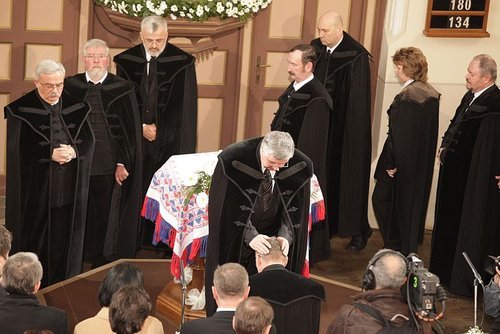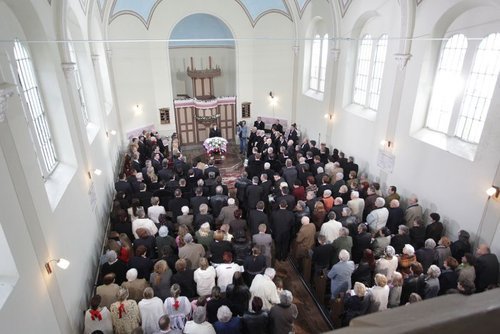Task: Community and Unity in Délvidék
2013. április 15., hétfőBéla Halász, the new bishop of the Reformed Christian Church in Serbia, spoke about the importance of community and the reconstruction of unity in his sermon at his bishop installation service on 13 April. The service, framed as a ceremonial worship, was held in the Reformed church in Hertelendyfalva.
Gusztáv Bölcskei, presiding bishop of the Synod of the Reformed Church in Hungary, in his ceremonial address based on Acts 4: 1-12 told: if someone were to question who we received our commission from, where our power and bravery to perform our mission comes from, we could answer it similar to the apostles: not from mundane power, but from Jesus Christ. His Gospel is the thing, which can reach hearts and renew the individual, the family and the nation. The church must go back to this resource, because only this way can it heal itself, resolve tensions and transcend conflicts. "He stands behind us – there is no bigger joy, approval and encouragement for us. " – said Bölcskei, and according to whom the life rooted in Christ means retention for our Reformed church and our nation, because when Christ is involved, it is needed for the world. The bishop finally warned, that the destruction, dissension and tension toward each other should end, and who stands behind the church and the bishop should not be a question.

Béla Halász, in his sermon based on Matthew 18: 19-20, spoke about the importance of the community and the reconstruction and strengthening of unity. As he said, these verses turn up often in the service at South-Bánát, and now it is not about smallness but about this unity rebuilding. The new bishop highlighted, that the church community can only be successful, if it is in spiritual unity, but this cannot be built without the main basis, Jesus Christ. He said that although the spirit of the age suggests placing it before anything else, in fact no one can be happy without a community, because people become spiritually depleted alone. The new church leader emphasized that he needs his fellow pastors, chief elders and elders to exercise this unity with him. He admitted that unity cannot come alive by command – cannot be fed by fear – but by the cited word of Christ from the Gospel alone. According to Halász, we must create unity with Jesus Christ, not just with each other, because we can only have effective service in the society this way. The bishop spoke about the necessity for reconciliation of the Reformed in Délvidék, and about the importance of spiritual care for pastors. Halász finally mentioned the issue of church discipline, emphasizing, that the base should be fraternal love and forgiveness.
The new bishop was greeted by Márta Mátrai from the Hungarian Parliament, in the name of Zoltán Balog (Minister of Human Resources), Tibor Fedor, head of department, Jenő Szász, leader of the Institute of National Strategy, and István Pásztor, president of the Assembly of Vojvodina Province. In the name of the bishops of General Convent, Béla Kató, Transylvanian bishop and in the name of its lay president, Pál Huszár, lay president of the Synod of the RCH expressed their congratulations for the new church leader. In the name of his church, Halász was greeted by Imre Hallgató, lay president in Délvidék, and by Károly Marton, dean of Bánát. The representative of the Serbian Head of State and representatives of the local churches were also among the speakers.

In the census held last year, 40,000 less Hungarians were counted in Serbia than 10 years earlier. Only 5 percent of the 251,000 compatriots in Vojvodina Province, 12,000 people are Reformed. Most of them are descendants of the families that moved into Délvidék during the 18th and 19th century from the Reformed market towns of the Great Plain and from the villages of Bukovina in hope of a better living. The Reformed Christian Church in Serbia is divided into two districts, Bácska and Bánát, their members live in thirteen mother congregations.
"Hertelendyfalva is the most southern Reformed congregation in the Carpathian-Basin, where inserting a Reformed bishop is not usual. But the nation and the church has to be held in its borders" – answered Béla Halász for the greetings. The bishop emphasized, that the Sekler that were tamed here 130 years ago were not held by human power, knowledge or will, but by God's love. He will hold all the Reformed in Délvidék, because this community has a mission in Serbian society and also as part of the Hungarian nation. Referring to the connections in the Carpathian-Basin he said: beside the spiritual unity, we have to pursue a structural unity as well, because this strengthens the testimony of Hungarian Reformed. Turning to the Serbian guests the new bishop expounded: instead of tolerance, the two nations should live next to each other as a fraternal community, because a strong Reformed church can only exist in a strong Serbia – these two things do not exclude, but are conditions of each other.
Translated by: Krisztina László
Contact us
Click here if you are interested in twinning.
Reformed Church in Hungary
Address: H-1146 Budapest, Abonyi utca 21.
PO Box: 1140 Budapest 70, Pf. 5
Email: oikumene@reformatus.hu
English, German and Korean language services in Budapest
Links
Recommended articles
-
Pastoral Letter in the Light of the Pandemic
Bishop Dr. István Szabó sent a pastoral letter of encouragement to the ministers serving in RCH’s congregations, expressing his gratitude for the persistence and creativity of the pastors.
-
RCH Joins in Pope's Call for Prayer
RCH published the call on congregations to join the initiative of Pope Francis, supported by ecumenical organisations, to unite in praying the Lord’s Prayer on Wednesday, 25 March, at noon.
-
English Speaking Worship Services Online
Each Sunday at 11 AM (CET) the St. Columba's Church of Scotland in Budapest, the international community of RCH invites you to join the worpship service on its facebook page.
-
Test of Humanity and Companionship
Reformatus.hu asked Dr. György Velkey, Director General of the Bethesda Children’s Hospital of RCH about the challenges of health care workers and ways of prevention against the pandemic.
-
All Church Events Suspended
In light of the coronavirus the Presidium of RCH requested congregations to suspend all church events with immediate effect. Beside restrictions, it calls for prayer, sobriety and responsibility.











